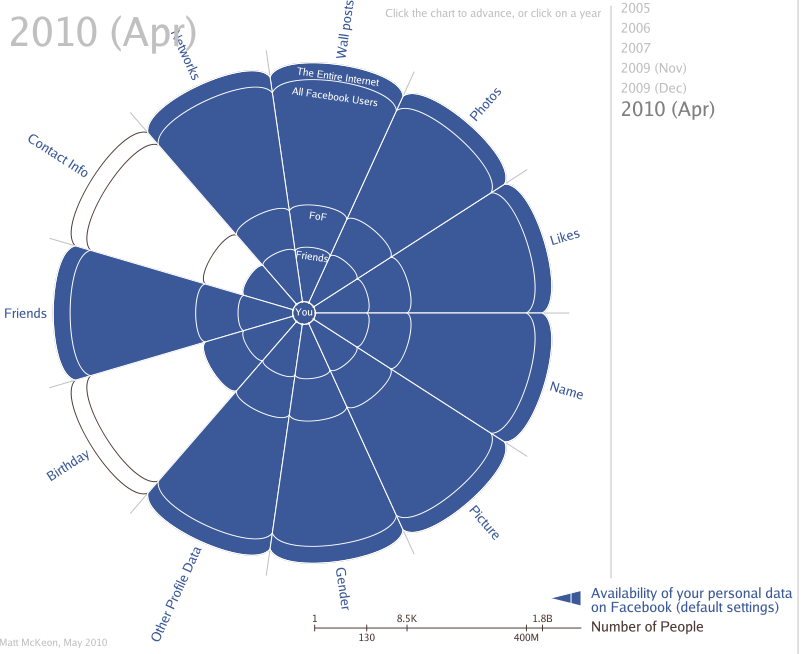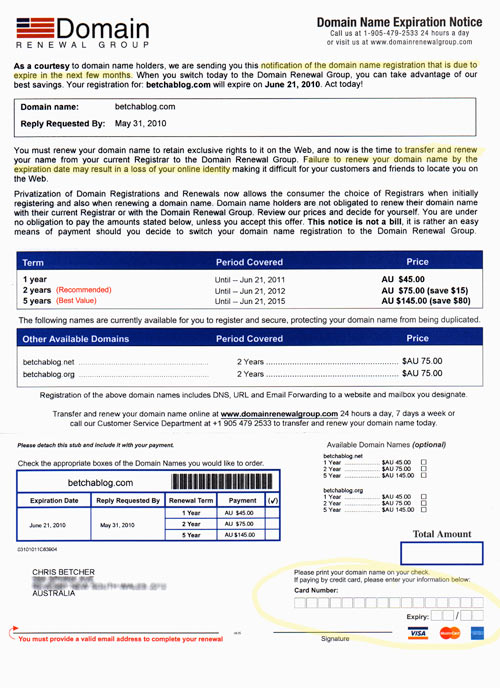 As you may have noticed, Facebook has been copping a great deal of flak in the media lately for recent changes to its privacy policy. There is growing evidence that Facebook as a company has few scruples or ethics when it comes to the way they view and use your personal data. The company has continually “baited and switched” the privacy settings in Facebook to the point where they have become so confusing and complex that few people truly understand them. There are something like 50 choices leading to about 170 different privacy variations possible, all needing to made in multiple locations in Facebook, with very little consistency or “expected behaviour” between them… consequently, there could be significant parts of your personal data that is being made public without you realising. Facebook seems to be working on the principle that most users never look at the default settings or take the time to think through their options. The most recent changes made to their privacy policy have made the sharing of your personal information “opt-out”, rather than the previous method of “opt-in”. This means that, unless you wade through the many privacy settings to turn them off, you are probably sharing far more than you realise. Added to this is the recent change to the Facebook Privacy Policy that essentially grants Facebook the rights to give your data to third parties and advertisers in order to target marketing to you. The infographic to the right was created by Matt McKeon, and links to his page where you can explore an interactive version which shows how the default sharing policy on Facebook has changed over time. It’s a bit scary!
As you may have noticed, Facebook has been copping a great deal of flak in the media lately for recent changes to its privacy policy. There is growing evidence that Facebook as a company has few scruples or ethics when it comes to the way they view and use your personal data. The company has continually “baited and switched” the privacy settings in Facebook to the point where they have become so confusing and complex that few people truly understand them. There are something like 50 choices leading to about 170 different privacy variations possible, all needing to made in multiple locations in Facebook, with very little consistency or “expected behaviour” between them… consequently, there could be significant parts of your personal data that is being made public without you realising. Facebook seems to be working on the principle that most users never look at the default settings or take the time to think through their options. The most recent changes made to their privacy policy have made the sharing of your personal information “opt-out”, rather than the previous method of “opt-in”. This means that, unless you wade through the many privacy settings to turn them off, you are probably sharing far more than you realise. Added to this is the recent change to the Facebook Privacy Policy that essentially grants Facebook the rights to give your data to third parties and advertisers in order to target marketing to you. The infographic to the right was created by Matt McKeon, and links to his page where you can explore an interactive version which shows how the default sharing policy on Facebook has changed over time. It’s a bit scary!
Interestingly, the Facebook Privacy Policy –which all Facebook users must agree to in order to use the service – has grown to become almost 6000 words long. Do you know what it says?
Personally, I find this unethical behaviour completely unacceptable and, along with many others across the web, have decided to close my Facebook account. Like many Facebook users, there have been times when I’ve found the service useful in helping me connect to friend and family, but their recent display of unethical, almost fascist, behaviour has left me with little choice but to cancel the service. Although I had taken the time in the past to secure my Facebook account (and I was savvy enough to do so) I cannot, in principle, support a company that shows such a cavalier attitude to the privacy of their user base.
If you are a Facebook user, I would strongly encourage you to check the settings in your account to make sure they are doing what you expect. There is a useful tool at http://www.reclaimprivacy.org/
that will actually probe your Facebook account to show you how it looks to the outside world. I would strongly encourage you to take the time to check yours.
There is also much bigger issues about Facebook. Its disregard for open standards, its walled garden approach that continually borrows steals ideas from all over the web, its willingness to do whatever it takes to keep users within the Facebook environment… I believe in the longer term will be bad for the Internet in general. That’s a much bigger issue and beyond the scope of this particular post, but when you add it all up, I can’t in all good faith continue to support a company that continually exhibits evil motives. Facebook might be a useful service for many, and it might offer a certain convenience factor by bringing things into one place, but there is no doubt in my mind that Facebook will bad for the open web in the longer term.
Many people in the Internet community are so outraged by the continual display of unethical behaviour of Facebook and their CEO Mark Zuckerberg that here is an official “Quit Facebook Day” organised for May 31.
If you feel strongly enough about the approach that Facebook is taking, you may also decide to close your account to send a message to the company that you are not willing to use a service that shows such scant concern for their users privacy.
Here are just a few articles (of many!) about the recent changes that you may want to read if you need more information. It’s worth getting the full story.
- The Erosion of Facebook Privacy eff.org
- Facebook Privacy Changes eff.org
- 7 Things to Stop Doing Now on Facebook yahoo.com
- Facebook’s Gone Rogue wired.com
- Top 10 Reasons You Should Quit Facebook gizmodo.com
- The Evolution Of Privacy on Facebook matt mckeon
I realise that many people find Facebook very useful, and many will not want to take the extreme step of deleting their account, but I do hope you take the time to make sure your account is sharing what you think it is, and to even perhaps share some of this conversation with your students.

 If there’s one thing I hate it’s when people assume I’m an idiot and try to rip me off.
If there’s one thing I hate it’s when people assume I’m an idiot and try to rip me off.